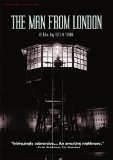| Reviews & Columns |
|
Reviews DVD TV on DVD Blu-ray 4K UHD International DVDs In Theaters Reviews by Studio Video Games Features Collector Series DVDs Easter Egg Database Interviews DVD Talk Radio Feature Articles Columns Anime Talk DVD Savant Horror DVDs The M.O.D. Squad Art House HD Talk Silent DVD
|
DVD Talk Forum |
|
|
| Resources |
|
DVD Price Search Customer Service #'s RCE Info Links |
|
Columns
|
|
|
Man From London, The
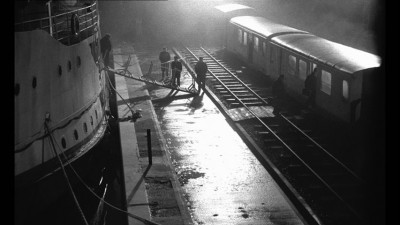
The great Hungarian cinéaste Béla Tarr's 2007 film The Man from London is a striking but relatively minor work for him ("relative" being the operative word; minor Tarr is still as essential as some very respectable directors' top-notch stuff), and as such the fact that it bore such a disproportionate burden in its production and reception seems doubly unfair. First, it was the follow-up to his widely admired 2001 picture The Werckmeister Harmonies (the best film of the decade, in my opinion); secondly, the tragic suicide of one of Tarr's producers dragged out production for years, to the point that anticipation either dwindled or became irrationally demanding of another masterpiece; and third, it was Tarr's first-ever film shot outside of Hungary, an international coproduction shot in France and featuring the always smart and game Tilda Swinton (Michael Clayton), by far the biggest "star" ever to step in front of Tarr's camera, circumstances which may have inadvertently signaled to some a commercial, crossover potential that this uncompromising film decidedly does not possess (at least, not any more than any of his films). The time, trouble, and expectations involved in making a movie are not directly proportional to the film's ambition, reach, and achievement, however, and now that all the dust from the lead-up to and lukewarm reception for the film has settled, we can see and appreciate The Man from London for what it seems to have been intended as all along: not a towering effort that would be even more earth-shattering than Werckmeister, but something of a low-key digression or palate-cleanser in Tarr's body of work--a sort of genre-lark project, albeit one pursued on Tarr's weighty, somber, unfailingly serious terms.
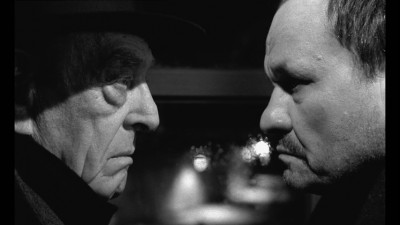
Tarr and his usual script collaborator, the novelist László Kraznahorkai (upon whose books all of Tarr's greatest output has been based), have here turned to a noirish 1934 crime novel by the beloved Belgian writer Georges Simenon. Simenon's story involves the shady sea-to-land exchange of a briefcase full of stolen British money that takes place on the docks of an anonymous French harbor town on the Channel after a ship traveling from the English side has pulled in. The handover is witnessed by a railway switchman, Maloin (Miroslav Krobot), whose station overlooks the harbor and allows him to see the comings and goings of the ships' passengers, all of whom walk directly off the boat and into the train waiting just a few steps away. Apparently, nobody cares to stay in or even see any part of this desolate, decaying, economically depressed town, where Maloin lives with his ferociously unhappy wife (Swinton) and his teenaged daughter, Henriette (Erika Bók, recognizable from her memorable role as a child in Tarr's superlative 1994 epic Sátántangó), in barely-scraping-by conditions, with Maloin perpetually made miserable because his daughter is humiliatingly treated like a servant by the shopkeepers that their financial need oblige her to work for. Prospects are, in short, bleak for Maloin, his family, and the entire world he lives in--a world that the rest of humanity tries to breeze through as quickly as possible. So when, shortly after the hand-off, Maloin witnesses a portside struggle over the stolen money that ends with the briefcase and one of the men plunging into the depths of the black water and the other man fleeing the scene of this accidental but suspicious-looking drowning, he retrieves it; upon discovering its contents, he says nothing to anyone. He simply begins drying out the currency, thinking he's stumbled upon a miraculous chance for his and his family's betterment. But by getting involved with this ominous money, he is wading over his head into some deep, grim intrigue, which begins to play out when an English police inspector arrives, along with the wife of the man who stole the money--the same man Maloin watched run away from his drowning partner in crime, a man who is now a suspected murderer, hiding somewhere in the town, and who may know that Maloin has the money.
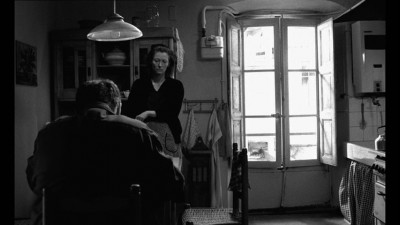
Tarr's focus (unlike, I'm willing to guess, that of Simenon's novel) is on the way the money and associated crimes draw Maloin and the English thief's wife together in a sort of ripple-effect loss of innocence. The victimization brought down on the desperate and/or gullible by other people's greedy machinations was the theme at the heart of Werckmeister Harmonies and Sátántangó, just as betrayal was central to Tarr's 1988 film Damnation, whose timeless, generalized, free-floating sense of noirishness The Man from London revisits. Tarr and Kraznahorkai's exploration of these recurring themes as they isolate them in and draw them out from Simenon's very different kind of story is a fascinating, brilliant exercise. Despite being his first film not at least implicitly set in Hungary (a fact somewhat distractingly highlighted by the dubbed-over voices of many of the film's Hungarian actors into French and English, with Swinton post-dubbing her own voice in French), Tarr and his cinematographer, Fred Keleman, transform The Man from London's little French port town into a pitch-black by night, grey by day, foggy, wet, rundown, and somehow stunningly gorgeous black-and-white world unto itself that is entirely of a piece with Tarr's other works. It's a transformation aided as usual by music from Tarr's longstanding composer, Mihaly Vig, whose score here sets the tone with low, droning harmonium noises and a melancholy recurring melody that have an Angelo Badalamenti-like quality (which also serves as a reminder of how Tarr's aesthetic, fiercely singular as it undeniably is, bears some surprising resemblances to David Lynch's in Eraserhead in its use of black and white to defamiliarize its sets and locations, and in its acute, enveloping sound design ).
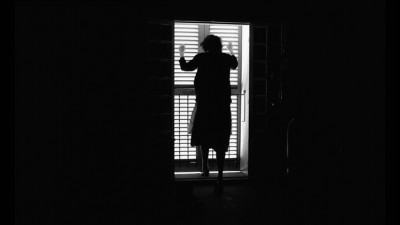
If their choice of material is little more than a pretext for Tarr and Kraznahorkai to reiterate and consolidate their long-running aesthetic and moral preoccupations, Tarr's sublime style is still in full, transfiguring force. His trademark mastery of slow, perfectly choreographed camera movement and long, uncut, wide-ranging takes elide any thriller-suspense, instead bringing out in an incredibly purified form the underlying sense of dread and inevitability--of corruption that eventually permeates everything and will come to you if you're too innocent to go looking for it--that is always the pessimistically tantalizing underpinning identifying a film as "noir." Tarr's way of showing us the world could be thought of as austere for its insistence on patient duration and its refusal of colorfulness or playfulness, but it is so heightened, meticulous, and relentless that it becomes its own kind of precisely achieved, glorious artifice (nor does the sheer beauty of the starkly contrasting tones of Keleman's photography ever make one feel deprived). If a filmmaker's style can be said to drench character, location, and event in austerity, that's what Béla Tarr does, and it's such a uniquely transporting experience that even something like The Man from London, a somewhat more limited exercise in that style, convinces you absolutely that it's worth taking every available opportunity to see it exercised in any way you can.
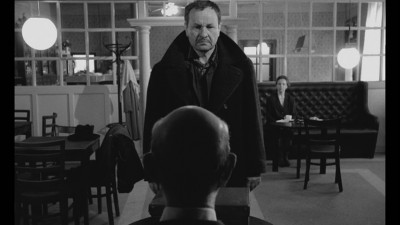
THE DVD:
The transfer is very good, with only a bit of aliasing and blur/pixellation noted (this apart from the nicely retained celluloid grain/texture, which of course garners no complaints). This is the first Béla Tarr film released to region 1 DVD anamorphically in its correct aspect ratio, 1.66:1, and it is great to see it presented this way, though I did note the tiniest, near-unnoticeable slivers of staggered/jagged cropping on the right hand side and in the top left part of the frame.
Sound:The disc's sound is quite nice; Tarr's usual meticulous sound design vis-à-vis things like footsteps, wind, crashing waves, and other (sometimes mysterious) background sound comes through clear and full, as does Mihaly Vig's lush, melancholy, ultra-atmospheric score.
Extras:Nothing save for IFC's silly Stateside trailer, which hides the fact that it's a foreign film, adds in tacky slo-mo and cheesy music that Tarr wouldn't be caught dead actually using in his film, and (of course) way oversells Tilda Swinton's brief-if-memorable appearance.
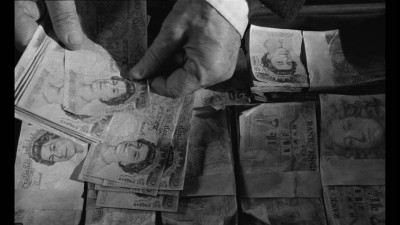
The Man from London wouldn't serve anyone well as an introduction to the great Béla Tarr (for that, I would recommend The Werckmeister Harmonies), and it must be counted as a less ambitious film than his finest, but that doesn't mean there isn't a potent, enthralling dose of his inimitable cinematic power in this narratively stripped-down, aesthetically built-up adaptation of Georges Simenon's policier. In light of Tarr's filmography, which has more depth than breadth (only four features, ranging from superb to perfect, in the nearly 25 years since Damnation, which marked the beginning of his "mature" phase), and of his current work, The Turin Horse, marking his permanent retirement from filmmaking, this odd-one-out still represents nothing less than an additional, invaluable, exciting opportunity to see a genuinely original master of the medium at work. It's more modestly scaled than his very best films, but though the morsel is somewhat smaller, it is still a treat that nobody who's interested in what the art of cinema is (still) capable of will want to pass it up. Highly Recommended.
|
| Popular Reviews |
| Sponsored Links |
|
|
| Sponsored Links |
|
|
| Release List | Reviews | Shop | Newsletter | Forum | DVD Giveaways | Blu-Ray | Advertise |
|
Copyright 2024 DVDTalk.com All Rights Reserved. Legal Info, Privacy Policy, Terms of Use,
Manage Preferences,
Your Privacy Choices | |||||||









